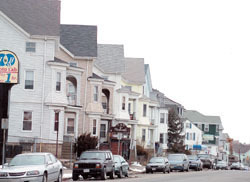
Landlords of multifamily homes in Fall River, like these on Plymouth Avenue, saw dramatic increases in their '05 tax assessments.
Multifamily homes hurt by tax valuation hikes
Fall River’s multifamily real estate market is suffering an identity crisis.
Its long-held distinction as a city with affordable apartments – capable of supporting a manufacturing-based work force – is history.
The scorching real estate market in Rhode Island and Greater Boston has caught up to the Mill City and so have rents and assessed values on these homes.
From 2003 to 2004, the assessed value of a Fall River three-family home jumped 24 percent – averaging $252,690. The average rent is $930 a month, according to Northeast Apartment Advisors, an Acton-based consulting firm that tracks the multi-family markets.
“A lot of people are being priced right out of the market,” said Maria Araujo, broker and owner of White House Realty in Fall River. “Rents are so high and we’re a manufacturing city. People don’t make a lot of money.”
The trend has city officials looking for ways to create more affordable housing. In the meantime, multifamily homeowners have been forced to rethink their investments.
Realtors say in recent month the rising rents shocked the market, with many people moving out of the city or choosing to pay a few hundred dollars more to buy homes or condos.
“For the last three years the rental market has been fantastic, but in the last eight months, vacancies have been going up … and (rents) have actually come down,” said Ron J. Rusin, Jr., broker-owner of REMAX Right Choice in Fall River and southeast region vice president of the Massachusetts Association of Realtors.
Meanwhile, landlords are facing higher assessments and the water and sewer fees have gone up. Rusin, who owns nine condos in one building, said he is paying $5,000 extra in taxes now that assessments have gone up.
Rusin said many landlords are turning tenements into condos. He said it’s possible to buy a six-family home for $300,000-$500,000 and turn it into six units that sell for at least $100,000 a piece.
The change in value put on these multifamily homes was just a matter of time.
The average multifamily home in the Boston area can sell for $500,000 to $700,000 because of the tight residential housing market there. The trend slowly trickled down to the rest of the state, including Fall River.
Pamela Davis, administrator of assessing in Fall River, said assessed values of multifamily homes had to be changed to reflect the market. By law assessments in the city had to go up because the figures needed to be tied to sales – within 10 percent of the average sales price.
According to Fall River’s tax records, assessed values of a two-family home in the city increased 16 percent, from a 2003 (for FY 2004 bill) assessment of $174,227 to a 2004 (for FY 2005 bill) assessment of $208,165. Values of three-family homes increased 24 percent, from $193,104 in 2003 (for FY 2004) to $252,690 for 2004 (for FY 2005), and that figure, according to Davis, is still understated.
“Housing is so tight in the metro area that it’s expanding into Fall River,” Davis said. “This is sticker shock to any homeowner who doesn’t pay attention to the market values.”
While interest rates are still favorable for buying a home, and Fall River’s property taxes are still manageable – the 2005 tax rate is 7.61 percent, the lowest residential rate in southeastern Massachusetts – it’s still difficult for residents to get into the market, especially when multi-family home prices are rising in leaps and bounds, Araujo said.
“If interest rates go up, nobody will be able to afford them, so prices will have to come down,” she said. “They aren’t reasonable for people in southeastern Massachusetts,” even though to Bostonians, most homes in Fall River are a steal.
Fall River Mayor Edward M. Lambert Jr. said the city recognizes the importance of working to retain affordable housing.
“The ability of young people to stay here is a priority. Affordability is something we’re very concerned about.
It’s ironic because the assessments are being affected by people buying homes here; it’s good news but we don’t want to price people out,” he said.
Massachusetts has a 40B law, which allows certain zoning variances or waivers if a portion of a development is affordable housing, and the city has federally funded loan programs for first-time buyers, according to Lambert .
The city is also currently redeveloping old housing authority units into 26 single-family homes for families who make 80 percent of the median income of approximately $32,000.











